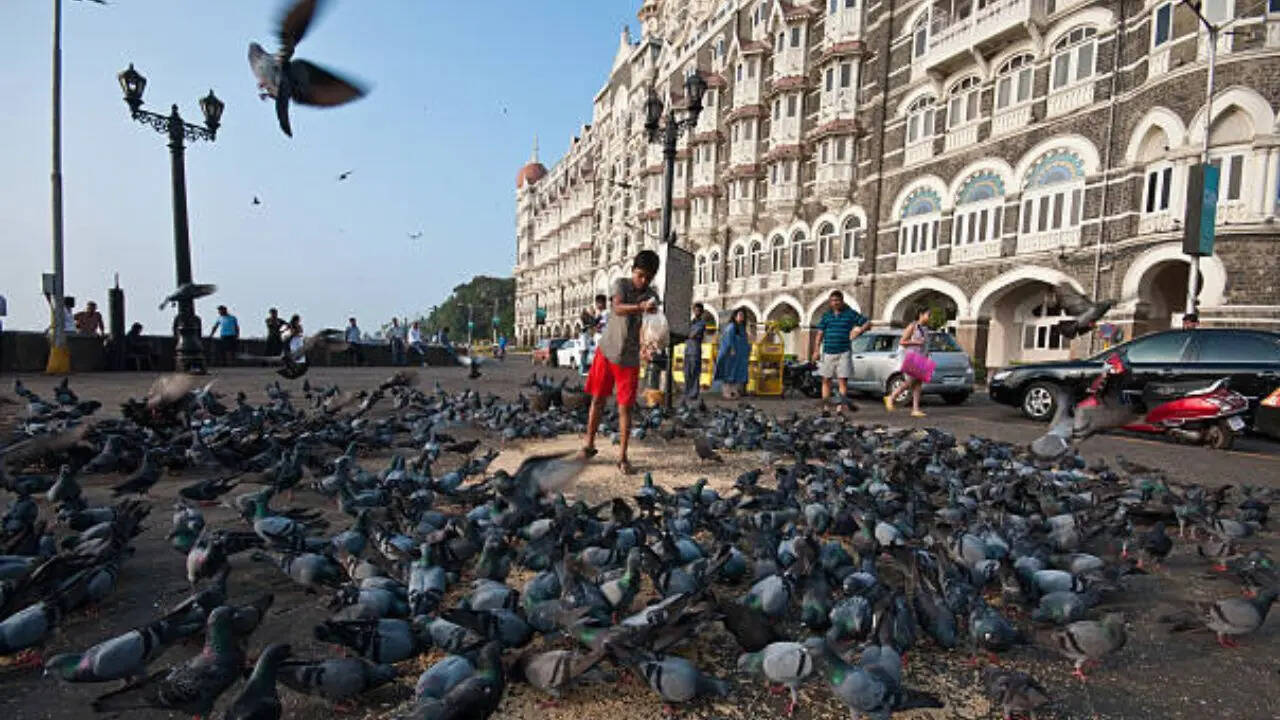Health
Mumbai’s Pigeon Feeding Ban Sparks Health and Civic Controversy

A recent decision by the Brihanmumbai Municipal Corporation (BMC) to ban pigeon feeding, commonly known as ‘kabutarkhanas,’ has ignited significant controversy across Maharashtra. Crowds gathered at various feeding sites as civic workers covered them with plastic sheets, drawing attention to the abrupt closure. While the state government criticized the ban, Chief Minister Devendra Fadnavis has urged for its enforcement, following a ruling from the Bombay High Court that declared pigeon feeding a public nuisance and a serious health risk.
This move has prompted protests from various community groups, including the Jain community, who contend that the ban could lead to severe consequences for the pigeons. Critics argue that thousands of pigeons could starve due to the sudden lack of food sources.
The health implications of pigeon feeding are substantial. Experts highlight that pigeon droppings can carry serious diseases such as cryptococcal meningitis, psittacosis, and salmonellosis. The droppings also contain high levels of acidity, which can damage buildings and monuments. One pigeon can produce over 12 kilograms of excrement annually, contributing to a range of health hazards associated with their presence.
Moreover, the droppings are known to spread Salmonella bacteria, which can infect humans and animals alike. Infection typically occurs through consumption of contaminated food or water, particularly raw or undercooked meat and poultry, unpasteurized milk, or vegetables that have come into contact with contaminated surfaces.
Continuous exposure to pigeon droppings can lead to serious lung conditions. Medical professionals warn that it is linked to the development of hypersensitivity pneumonitis, a condition that causes inflammation in the small air sacs of the lungs. This disease can manifest as both acute and chronic symptoms, making it a significant concern for those frequently exposed to pigeon droppings or feathers.
Health Risks of Pigeon Feeding
According to health experts, the symptoms of hypersensitivity pneumonitis can be both acute and chronic, posing long-term health risks. Acute symptoms may arise within hours of exposure and can include breathlessness, a persistent dry cough, chest tightness, chills, fever, fatigue, and unintended weight loss. Chronic exposure can lead to severe lung damage that may not be reversible, emphasizing the need for preventive measures.
To reduce the risk of developing hypersensitivity pneumonitis, health professionals recommend avoiding exposure to known allergens. If individuals must be around potential allergens, wearing personal protective equipment, such as masks that filter small particles, can be essential. Maintaining clean living spaces, particularly for pets, and avoiding feather-filled bedding can also help minimize exposure.
The controversy surrounding the pigeon feeding ban in Mumbai reflects broader concerns about public health and community practices. As discussions continue, the balance between public safety and cultural traditions remains a contentious issue in Maharashtra.
-

 World5 months ago
World5 months agoSBI Announces QIP Floor Price at ₹811.05 Per Share
-

 Lifestyle5 months ago
Lifestyle5 months agoCept Unveils ₹3.1 Crore Urban Mobility Plan for Sustainable Growth
-

 Science4 months ago
Science4 months agoNew Blood Group Discovered in South Indian Woman at Rotary Centre
-

 World5 months ago
World5 months agoTorrential Rains Cause Flash Flooding in New York and New Jersey
-

 Top Stories5 months ago
Top Stories5 months agoKonkani Cultural Organisation to Host Pearl Jubilee in Abu Dhabi
-

 Sports4 months ago
Sports4 months agoBroad Advocates for Bowling Change Ahead of Final Test Against India
-

 Science5 months ago
Science5 months agoNothing Headphone 1 Review: A Bold Contender in Audio Design
-

 Top Stories5 months ago
Top Stories5 months agoAir India Crash Investigation Highlights Boeing Fuel Switch Concerns
-

 Business5 months ago
Business5 months agoIndian Stock Market Rebounds: Sensex and Nifty Rise After Four-Day Decline
-

 Sports4 months ago
Sports4 months agoCristian Totti Retires at 19: Pressure of Fame Takes Toll
-

 Politics5 months ago
Politics5 months agoAbandoned Doberman Finds New Home After Journey to Prague
-

 Top Stories5 months ago
Top Stories5 months agoPatna Bank Manager Abhishek Varun Found Dead in Well









